Kevin DeYoung's Blog, page 194
December 4, 2010
Faithfulness Under Fire
William Boekstein has written a great children's book about Guido de Bres, author of the Belgic Confession. I have the book and my kids enjoy it. The illustrations by Evan Hughes are excellent.
Here's a short video introducing Faithfulness Under Fire: The Story of Guido de Bres.
He Stopped Looking for the Ladder
Russell Moore has a way with words. I love the stirring conclusion to his chapter "Kingdom: Heaven after Earth, Heaven on Earth, or Something Else Entirely?" The chapter is part of the soon to be released book Don't Call it a Comeback: The Old Faith for a New Day.
If evangelical Christianity is about anything, it ought to be about the gospel—that's the meaning of the term evangelical itself. If so, we must recognize that our mission is to be found in what makes the good news good. We don't have to be left to our own striving and clawing. And we don't have to try to be emperor of our own lives, or of those around us. We point instead to a kingdom that overshadows—and knocks down—every rival rule, including our own.
This means our proclamation agrees with our non-Christian friends that something's deeply wrong with the way things are, even as we show them how they're not nearly outraged enough by the world the way it is. We tell them—and remind ourselves—of the good news of an invisible kingdom now in heaven, showing the pockets of the kingdom in our struggling little churches, and singing out for the glorious kingdom that will one day explode through the eastern skies. But, most importantly, we announce who is King in that kingdom: the One who joined us in our grave holes, even as we alternated between a hardened self-sufficiency and a screaming for the snake father we'd chosen for ourselves. Our Brother/Lord brought the kingdom in a way we'd never have thought of. He stopped looking for the ladder, and cried out to his Father.
And he was heard.
December 3, 2010
Can That Be Right? The New Testament's Use of Old Testament Prophecy
 It's Christmas season and that means renewed attention on Messianic prophecy. Ah, the familiar sounds of "a virgin shall give birth," "the government shall be upon his shoulders," and good ole "Bethlehem Ephrathah." It makes a churchgoer feel all warm and cuddly inside.
It's Christmas season and that means renewed attention on Messianic prophecy. Ah, the familiar sounds of "a virgin shall give birth," "the government shall be upon his shoulders," and good ole "Bethlehem Ephrathah." It makes a churchgoer feel all warm and cuddly inside.
And frankly, a bit confused.
If we're honest, the way the New Testament uses the Old Testament seems a little far-fetched. I mean, we can see, just like the scribes did, that Micah 5:2 is a foretelling of the Messiah's birth in Bethlehem (Matt. 2:1-6), but was Hosea really making a prediction about the Christ just because he happened to mention "Egypt" (Hos. 11:1) and Jesus' family fled to Egypt (Matt. 2:15)? If we interpreted Scripture like Matthew does, we'd be chased out of our pulpits and small groups, right?
The New Testament's use of the Old Testament is a complicated subject. Even evangelical scholars don't agree on all the particulars of the best approach (see for example this book and D.A. Carson's review). Still, there are several principles, clarifications, and reminders that can help us make sense of the Apostles' seemingly willy-nilly use of the Old Testament.
(For the most part, the following points were gleaned from Doug Moo's chapter "The Problem of Sensus Plenior" in Hermeneutics, Authority, and Canon [edited by D.A. Carson and John Woodbridge]. A revision of this chapter from Moo and Andy Naselli will be included in volume 1 of Carson's The Scripture Project which is scheduled to be released by Eerdmans in 2012. Jared Compton makes many of the same points in his fine Themelios piece "Shared Intentions? Reflections on Inspiration and Interpretation in Light of Scripture's Dual Authorship.")
1. Keep in mind the NT's purpose in referencing the OT. We often think every time the OT is referenced it must mean the NT author is trying to exegete the OT passage. But there is no rule of inerrancy which says the NT author must always be attempting to give the correct interpretation of a given passage. The NT author may not be attempting an interpretation at all. If someone asks me, "How is the editing work going" and I say, "It's tedious–line upon line, precept upon precept" this doesn't mean I'm trying to exegete Isaiah 28:10. I'm simply employing the familiar language of a familiar passage.
2. Along these lines, remember the NT often uses the OT simply as a vehicle of expression. The NT writers were hugely familiar with the OT. It's no wonder they employed its vocabulary. In the same way, Westerners might use a line from Shakespeare or the Bible because it is familiar, but without intending to explain its context or original meaning.
3. The NT may press home the significance of a passage without trying to explain its original meaning. For example, Moo points to Paul's use of Deuteronomy 25:4 ("You shall not muzzle an ox when it treads out the grain") in 1 Corinthians 9:9. Critics argue that Paul is taking the Law of Moses out of context by saying this passage is about paying ministers. But surely Paul is justified in pulling a fair inference out of the passage and applying it to his own context.
4. We must allow for a broader view of "fulfillment" language. A lot of trouble could be avoided if we understood that the use of plēroō (fulfilled) does not have to mean "and so this verse predicted that Jesus would do or say this thing that just happened." As Moo says, "The word is used in the New Testament to indicate the broad redemptive-historical relationship of the new, climactic revelation of God in Christ to the preparatory, incomplete revelation to and through Israel" (191). In other words, "fulfilled" does not mean the OT text in question is a direct prophecy. Consequently, Jesus flight to Egypt can fulfill Hosea 11:1, not because Hosea ever intended to predict a Messianic trip down south, but because Jesus is God's greater Son who is the embodiment of a new Israel. Jesus is on an Exodus journey of his own (as I'll show in a further post next week). Hosea did not predict the Holy Family's flight to Egypt, nor does Matthew suggest the prophet meant to do so. But Matthew does see that the story of Israel's exodus, alluded to in Hosea, is brought to its full redemptive-historical revelation in Christ.
5. Similarly, some OT passages are fulfilled typologically. This is different than allegory. And allegory looks for meaning behind the text where typology finds a developed meaning that is rooted in the text (see Moo 195). Jesus' passion can be seen as a fulfillment of David's heart cry in Psalm 22 not because David thought he was predicting the death of the Messiah, but because David, as the king and as the promised progenitor of the Messiah, was a type of Christ whose cries anticipated the final dereliction of David's greater son.
6. OT prophecy is full of examples where there is a near and far fulfillment. Isaiah 40, for example, was a word of comfort about the return from Babylon, but later we see it also was a word about John the Baptist who would prepare the way for the Messiah (Mark 1:2-3). Much of the prophetic witness implicitly anticipates a future, fuller, often eschatological fulfillment. Isaiah may not have known that his words about the virgin were Messianic, but this does not mean he'd be surprised to know they were. Israel was always waiting for the everlasting kingdom and the final Deliverer. I think the prophets understood that what they foretold (and forth-told) was for their day, but it could be for the future as well.
Two Other Questions
Of course, the foregoing principles raise two thorny questions:
1) Did the OT authors say more than they knew? That is, is there a meaning in some OT texts that we know by the NT but would have been unknown to the authors? Excellent scholars like Walter Kaiser have argued strenuously that there can be no double meanings or fuller meanings in the OT text. While Kaiser is certainly right to insist that many problem passages can be "solved" by paying careful attention to the original context and the theological background, I agree with Moo and others who argue, "There are places where the New Testament attributes to Old Testament text more meaning than it can be legitimately inferred the human author was aware of" (201).
Does this mean we are doomed to "hermeneutical nihilism?" I don't think so. First, every interpretation of Scripture must be constrained by Scripture. Many scholars now argue for "a canonical approach" to understanding the NT use of the OT. The Bible is a literary whole. In some sense, the OT is an incomplete, unfinished book. But once the whole is complete, we are able to make better sense of earlier parts and see things that the authors at an "unfinished" time may have missed. Second, we must remember that none of this undermines authorial intent. The NT authors did not find meanings in the OT the original authors never intended. Perhaps the human authors were unaware of the fullness of their words, but do not forget there is also a Divine author. Under the inspiration of the Spirit, the NT writers were able to understand the authorial intent that may not have been fully known to the OT human authors. The NT does not find a meaning that isn't there, only (and on occasion) a meaning that was not obvious to one half of the writing team.
2) The second question raised by this discussion is whether we can imitate the hermeneutic employed at times by the NT writers. With Moo, I would give a firm "that depends." On the one hand, we do not have the Spirit's inspiration to know the mind of God in the same way. So we should be extremely cautious about finding "fuller" meanings in the text. On the other hand, we should read the Bible with same theologically informed, salvation-historical, whole canon approach that we see employed in the NT use of the OT (Moo 206, 210).
Lessons Learned
One of the practical lessons from all this is that we should avoid a simplistic approach to OT-NT fulfillment. Sometimes with good apologetic and evangelistic motives we will point to all the OT prophecies about Christ and then run down a list of all the NT fulfillments. There is truth here, but if we set things up as "here's the prediction; here's the prediction come true" we are bound to confuse people. We may even cause people to doubt the prophetic witness rather than trust it. All the prophecies cited in the NT are true and truly fulfilled, but it's all a bit more complicated (and actually more glorious) than we sometimes let on.
The other lesson is that we need not be embarrassed to use a strong theological lens on top of our appropriate grammatical-historical lens. This is not an invitation to allegory or a reason to search for hidden spiritual meanings like Super Mario finds his mushrooms. But it does mean we should, like the NT writers did, read the Bible across the whole Bible. We should see Jesus in all of Scripture. We should read the end in the light of the beginning and the beginning in view of the end. Above all, we can celebrate that Jesus is the perfect fulfillment of all that was imperfectly prefigured in the OT. This alone will make a fuller, deeper, richer Christmas story.
December 2, 2010
Something Old, Something New: Trevin Wax Looks at N.T. Wright
Trevin Wax has just finished a fascinating series of posts exploring "old" N.T. Wright compared to "new" N.T. Wright. As you might imagine, some important themes are still present, but others are sadly less prominent.
For example, at one point Trevin concludes:
Critics of Wright are wrong to charge him with denying penal substitution. There is however a place where a thoughtful critique may be warranted, and that is in terms of the emphasis Wright places upon penal substitution today. In this early (and brief book), one finds multiple references to the substitutionary atonement. Wright's later devotional works (such as Christians at the Cross, a collection of Lenten and Easter homilies) include nary a reference to this view of the atonement.
All four pieces in Trevin's series are worth a look-see.
Opening Overview and Development
Early View of the Atonement
Early View of Heaven
Early View of Virtue
My Computer Gave Up the Ghost
The technology gremlins have killed my computer. Sorry, no real blogging today. All I can manage is a repeat of one of my first entries for Monday Morning Humor. I hope to be back tomorrow with something more substantial.
December 1, 2010
October/November Book List
October/November
[image error]1. Carl Trueman. Republocrat: Confessions of a Liberal Conservative (P&R 2010). Whimsical and full of good sense (and enough provocations to upset just about everyone). See full review here.
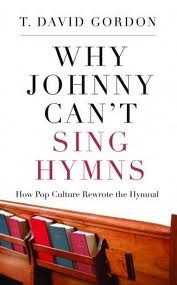 2. T. David Gordon. Why Johnny Can't Sing Hymns: How Pop Culture Rewrote the Hymnal (P&R 2010). Makes a strong argument and works well as a prescription for retaining classic hymnody. Less convincing when it begins to sound like a proscription against other kinds of music (read: pop) in our services.
2. T. David Gordon. Why Johnny Can't Sing Hymns: How Pop Culture Rewrote the Hymnal (P&R 2010). Makes a strong argument and works well as a prescription for retaining classic hymnody. Less convincing when it begins to sound like a proscription against other kinds of music (read: pop) in our services.
[image error]3. Sarah Ruden. Paul Among the People: The Apostle Reinterpreted and Reimagined in his Own Time (Pantheon 2010). If you are interested in a politically correct rescue of Paul made possible by reinterpreting his words (and our English translations) through the lens of hyper-sexualized Greek and Roman literature, all of which were written centuries before the Apostle, then this is your book.
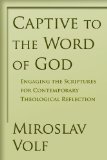 4. Miroslav Volf. Captive to the Word of God: Engaging the Scriptures for Contemporary Theological Reflection (Eerdmans 2010). Disappointing collection of essay on the nature and content of Scripture. Where Volf sounds most evangelical he is also the most cautious and apologetic. Where he sounds most liberal he seems most impassioned and sure.
4. Miroslav Volf. Captive to the Word of God: Engaging the Scriptures for Contemporary Theological Reflection (Eerdmans 2010). Disappointing collection of essay on the nature and content of Scripture. Where Volf sounds most evangelical he is also the most cautious and apologetic. Where he sounds most liberal he seems most impassioned and sure.
[image error]5. Collin Hansen and John Woodbridge. A God-Sized Vision: Revival Stores that Stretch and Stir (Zondervan 2010). My blurb: Hansen and Woodbridge have given us a rare book on revival. They affirm the supernatural, without being sensationalistic. They celebrate the surprising work of God, without downplaying the ordinary. They demonstrate the ecumenical scope of revival, without ignoring the important role theology plays in the ongoing health of the church. This book will guard against complacency, cynicism, and, just as importantly, the naivete that thinks revival solves everything. An encouraging, judicious, well-told tale of God's amazing work around the globe throughout the ages.
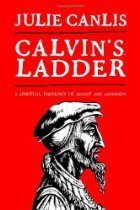 6. Julie Canlis. Calvin's Ladder: A Spiritual Theology of Ascent and Ascension (Eerdmans 2010). Despite some dense prose and an allergic reaction to Calvin's evangelical views on the atonement and imputation, Canlis makes an important and learned contribution toward understanding Calvin's view of our union and communion with Christ.
6. Julie Canlis. Calvin's Ladder: A Spiritual Theology of Ascent and Ascension (Eerdmans 2010). Despite some dense prose and an allergic reaction to Calvin's evangelical views on the atonement and imputation, Canlis makes an important and learned contribution toward understanding Calvin's view of our union and communion with Christ.
[image error]7. R. Scott Clark and Joel E. Kim. Always Reformed: Essays in Honor of W. Robert Godfrey (Westminster Seminary California 2010). A thoughtful and thought provoking collection of essays. Van Drunen on "Calvin, Kuyper, and 'Christian Culture'" and Horton on "Reformed and Always Reforming" were particularly good. Riddlebarger on "The Reformation of the Supper" is a concise case for more frequent celebration of Communion. Hart's plea for a more polemical Reformed faith (in "The Rise, Fall, and Resurrection of J. Gresham Machen's Warrior Children") does not strike me as the most helpful advice for the likely reader of this volume.
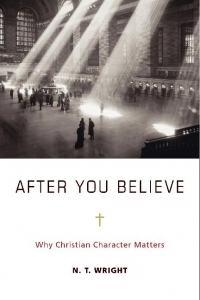 8. N.T. Wright. After You Believe: Why Christian Character Matters (HarperOne 2010). Wright makes a strong (and necessary) case that transformation is at the heart of the gospel project and that this project is not an easy let-go-and-let-God affair. If only there were not the usual swipes at "going to heaven after you die," an overwrought transformationist ethic (reading too much into the word ""priest" for example), and the unwarranted caricatures of Martin Luther.
8. N.T. Wright. After You Believe: Why Christian Character Matters (HarperOne 2010). Wright makes a strong (and necessary) case that transformation is at the heart of the gospel project and that this project is not an easy let-go-and-let-God affair. If only there were not the usual swipes at "going to heaven after you die," an overwrought transformationist ethic (reading too much into the word ""priest" for example), and the unwarranted caricatures of Martin Luther.
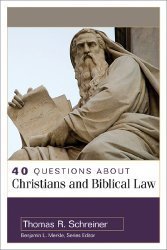 9. Thomas R. Schreiner. 40 Questions About Christians and Biblical Law (Kregel 2010). The most accessible book on the most difficult topic in Christian theology. Confessional Presbyterian/Reformed folks won't agree with everything, but the structure is so clear, the summaries so helpful, and the fidelity to Scripture so evident that this is easily one of the best books of the year.
9. Thomas R. Schreiner. 40 Questions About Christians and Biblical Law (Kregel 2010). The most accessible book on the most difficult topic in Christian theology. Confessional Presbyterian/Reformed folks won't agree with everything, but the structure is so clear, the summaries so helpful, and the fidelity to Scripture so evident that this is easily one of the best books of the year.
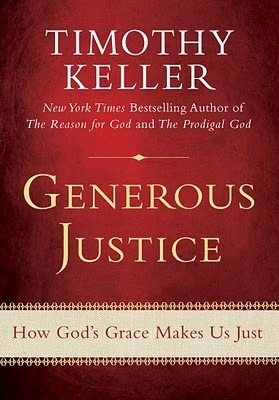 10. Timothy Keller. Generous Justice: How God's Grace Makes Us Just (Dutton 2010). This is the most biblically informed and intellectually careful (read the footnootes!) "social justice" book I know of. Justice skeptics and justice proponents alike will learn from Generous Justice. I am still unconvinced by Keller's more expansive definition of what the Bible means to "do justice," but the main thrust of the book is well-argued and often inspiring. As Keller reminds us, "a life poured out in doing justice for the poor is the inevitable sign of any real, true gospel faith."
10. Timothy Keller. Generous Justice: How God's Grace Makes Us Just (Dutton 2010). This is the most biblically informed and intellectually careful (read the footnootes!) "social justice" book I know of. Justice skeptics and justice proponents alike will learn from Generous Justice. I am still unconvinced by Keller's more expansive definition of what the Bible means to "do justice," but the main thrust of the book is well-argued and often inspiring. As Keller reminds us, "a life poured out in doing justice for the poor is the inevitable sign of any real, true gospel faith."
November 30, 2010
Some Comments on Comments
It's probably helpful every now and then to make some comments about blog comments.
1. I'm grateful for most of the comments. They are often encouraging and edifying. I learn new things. Sometimes I laugh. Thanks.
2. I do not have time to read the comments very carefully. I try to at least skim the comments that show up on the first day. After that, sometimes I go through them and sometimes I don't. I'm sorry if you ask thoughtful questions and I'm unable to respond. I can't answer every email or every blog comment.
3. I don't usually delete comments, but sometimes I do. Here's why:
a) They are too long. A comment should be a comment not a dissertation. If it looks like a separate blog post in the comments section, it could get the axe.
b) The comment includes a lot of links. On occasion a link is appropriate, but if you start referencing ten other blogs (especially your own!) I'm probably going to hit "trash." Sorry, but again, comments should be comments, not advertisements.
c) The comment doesn't make sense or is off the subject. No, we probably don't want to check out that link that has nothing to do with the post. And we don't need to hear about the latest word study in Syriac. Not trying to be mean, just sayin.
d) The comment is strident or cruel.
e) The comment thread has been hijacked. Once ObscureLatinPhraseBlogger and MilitantSoundingThrowDownBoy use the blog as their personal theological litter box it's time to shut er down.
4. Let me repeat, I'm thankful for the vast majority of comments I come across on the blog. I'm grateful for this technology and the chance to write and serve the Lord.
The Doctrine of Scripture: Four Points from Two Verses
At the end of 2 Peter, right in the middle of a final reminder about growing in godliness, we find two remarkable verses that help form a Christian doctrine of Scripture.
And count the patience of our Lord as salvation, just as our beloved brother Paul also wrote to you according to the wisdom given him, as he does in all his letters when he speaks in them of these matters. There are some things in them that are hard to understand, which the ignorant and unstable twist to their own destruction, as they do the other Scriptures (2 Peter 3:15-16).
On one level, in these two verses Peter is simply saying "Paul agrees with me on this issue of holiness, not with the false teachers." But in the course of saying that Peter makes some crucial claims about Scripture. Let me highlight four.
1. We see that apostolic writings were being added alongside the Old Testament canon as authoritative Scripture. Verse 16 says some people are twisting Paul's letters, as they do the other Scriptures. The word in Greek is graphe. It occurs 49 others times in the New Testament and in every instance it refers to the Old Testament Scriptures. It's remarkable that Peter, writing in the 60s, would place Paul's writings alongside the Old Testament as equally authoritative.
And what's more, Peter doesn't even try to defend this astounding claim. In his mind he's stating the obvious. This was not a point of contention. Peter didn't need to convince these churches that Paul's writings were authoritative on the level of Old Testament Scripture. Apparently, they already recognized that, assumed that, and treated Paul's writings in that way. So when Peter refers in verse 15 to the wisdom given to Paul he is probably thinking of divine inspiration, not just that the man from Tarsus was a smart guy.
2. Scripture can be hard to understand. Christians throughout the centuries have taken great comfort in verse 16 where Peter admits there are some things in Paul's writings that are hard to understand. Even Peter, this great Apostle, this first among equals in the early church, recognized there are some tricky parts in the Bible. It's not all simple stuff.
Christians have always believed in what's called "the perspicuity of Scripture." That means Scripture is clear; it's understandable. But the doctrine of perspicuity has never implied that all parts of Scripture are equally obvious or equally important. Perspicuity means the main things are the plain things. It means that the message of salvation is clear. It means the basic and most central stuff of the biblical storyline is understandable, even if you're not the sharpest knife in the drawer, even if you're uneducated, even if you're a kid. We can all get that Jesus is the Christ, that we must repent, believe in Christ, and obey his commands. This much is clear. But that doesn't mean everything is clear. Some parts require a lot of study. Some parts need scholarly attention. Some doctrines are complicated. Some parts of the Bible are quite difficult. Just ask Peter about Paul.
3. But the flip side of this second point is that even the hard parts in the Bible still have right and wrong interpretations. Notice, Peter didn't say, "Some things in Paul are hard to understand. So who am I to say what's right and what's wrong? All we have are our interpretations." No, he says, some things are hard to understand, which the ignorant and unstable twist to their own destruction. Peter did not think just because something was hard there couldn't be a right answer to that hard problem. Some Christians are intellectually lazy. They dishonor the word and the God of the word with their quick surrender into the land of "who knows?" and "it's not a salvation issues, so who cares?" They say, "Understanding the doctrine of election is hard. Coming to a conclusion on homosexuality is difficult. Making sense of the roles of men and women is impossible." And so we give up and figure no interpretation can be better than another. Peter, on the other hand, is not afraid to say that the presence of hard texts does not preclude there being right and wrong interpretations.
4. Some wrong interpretations can kill you. There is certainly room for disagreements among Christians about some issues. We see this clearly in Romans 14. We don't have to be lockstep on every debatable matter. But on some issues errant interpretations are not just wrong, they are dead wrong. The false teachers in Peter's midst were twisting the Scriptures to their own destruction. They were quoting Scripture, but not well.
I've been in debates before where both sides are using the Bible. And what sometimes happens is that good people get confused and think "Well, if they both use the Bible, I guess both sides must be ok." But Peter suggests you can use the Scripture, but use it in such a misguided, unfaithful, twisted way that your use of Scripture actually leads to your own downfall. Not every issue is this serious, but certainly when we are talking about whether or not God's people must strive for holy lives and whether or not sexual sin is to be taken seriously (2 Peter 2) we are talking about an issue at the heart of Christianity. So to twist the Bible so that it allows you to call sin a blessing and to call those who oppose the sin all sorts of names that end with "phobia" or "mental" is to spin the Scriptures to your own destruction.
November 29, 2010
Monday Morning Humor
I'm not sure if this is a real caller (seems to be), but you got to love the palpable excitement over a can opener. It also seems like this guy has seen some interesting stuff in his life.
November 27, 2010
Advent Devotional from Gordon-Conwell
If you are looking for an online Advent devotional series, you may want to check out Journey to the Manger, produced by the faculty at Gordon-Conwell Theological Seminary. I haven't read the series, but it looks promising. Chris Castaldo writes about it here. You can also click on the banner ad on the right side of this blog page. From there you will be directed to sign up to receive the the daily devotional via email for the season of Advent.



